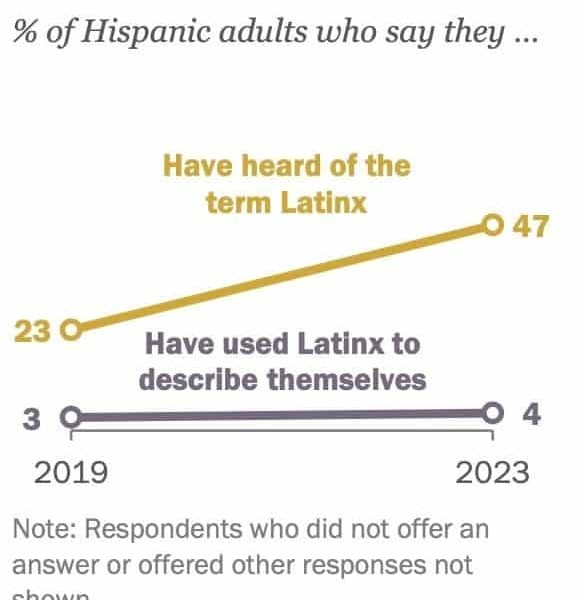Pew: ‘Latinx’ Awareness Doubled Since 2019, Still 4% Use Term
This morning, the Pew team is back at it with a new analysis regarding Latino identity and the labels we use and are imposed on us as a community.

Published with permission from The Latino Newsletter.
Happy Thursday to the 712 of you (yes!) who have already subscribed to The Latino Newsletter. If you like our work and want to make a tax-deductible donation to keep this effort free and accessible to all, you can do so here.
I am a big fan of the Pew Research Center, especially its work covering U.S. Latino communities with yummy data reports. If you know my work over the years, I tend to share a lot of Pew reports.
This morning, the Pew team is back at it with a new analysis regarding Latino identity and the labels we use and are imposed on us as a community.
Here is part of the study’s lede:
After years of public use by celebrities, leaders, media, academics and others, awareness of Latinx has grown among U.S. Latinos. Nearly half (47%) say they have heard of Latinx, up from 23% who said the same in 2019. Notably, awareness of Latinx has grown across nearly all major demographic subgroups of U.S. Latinos.
Still, about half of the population that Latinx is meant to describe has never heard of the term.

While awareness of the term has grown, the share who use Latinx to describe themselves is statistically unchanged: 4% of Latino adults say they have used Latinx to describe themselves, little changed from the 3% who said the same in 2019.

Here are some other findings from that study (the full report is here):
- 13% of lesbian, gay or bisexual Latinos say they have used Latinx to describe themselves.
- 9% of Afro-Latinos say they use Latinx
- 18% of Hispanic adults have heard of the term Latine, while 79% say they have not.
- A large majority of U.S. adults who trace their roots to Spain and Latin America continue to prefer the terms Hispanic or Latino when choosing a pan-ethnic term to describe themselves as a group (81%). Meanwhile, 15% have no preference and only 3% prefer Latinx or Latine. Yet about one-in-four who have used Latinx to describe themselves personally (24%) prefer Latinx or Latine to describe the Hispanic or Latino population overall.

This week I reached out to Mark Hugo Lopez, Pew’s director of race and ethnicity research at Pew Research Center. I asked Mark the following questions via email: “Why do this survey again? Aren’t we past the labeling debate? What is the best case for repeating this survey this year after the last one?”
Here is the response Mark sent back to me (by the way, I am also a big fan of Mark’s):
“There are many reasons to repeat our survey. First, Latinx is used by almost 2 million people with Latino/Hispanic ancestry. While that is a small share of the Latino adult population, it is still a notable number of people. Second, Latinx continues to be a target of criticism—some even high profile. And it continues to have strong support from others,” Mark wrote.
“As you might expect, in an environment like that, awareness is up, though still nowhere near the levels for Hispanic and Latino. And despite this, the share of adult Latinos who use it is little changed. Third, we wanted to measure where awareness is for a recently emerged alternative—Latine. There, awareness is low—for now. Finally, labels and identity terms rise and fall as the way the public seeks to describe its changes. Look at how the Census Bureau’s use of racial identity terms has evolved over the nation’s history (link). And among Latinos, the debate about ‘Hispanic’ or ‘Latino/a’ hasn’t really gone away.”
What are your thoughts? Let me know by replying to this post.
What We’re Reading
The 2024 U.S. Latino GDP Report: The Latino Donor Collaborative’s official U.S. Latino GDP report was released Thursday morning during the LDC’s annual L’Attitude conference. According to the LDC, U.S. Latinos now have a GDP measured at $3.6 trillion. That’s “trillion” with a T. Read the complete report below.
A Master Class in Journalism: Props to journalist José María Del Pino for this exchange with Trump adviser Stephen Miller:
I asked Stephen Miller, one of Donald Trump’s top advisors, what is the evidence for saying that Caracas and Venezuela are safer than the United States. He began by answering that it is the government’s numbers. I asked him if he trusted Maduro’s numbers. And this was his… x.com/i/web/status/1…
— José María Del Pino (@josemdelpino)
4:47 PM • Sep 11, 2024
About the Author
Julio Ricardo Varela is the founder and interim publisher of The Latino Newsletter.
Do you believe in creating new journalism lanes for Latinos and Latinas? Do you believe that U.S. mainstream outlets will never understand our community? Consider donating to The Latino Newsletter. Any little bit helps to keep this newsletter free and accessible to all. ¡Gracias mil!





